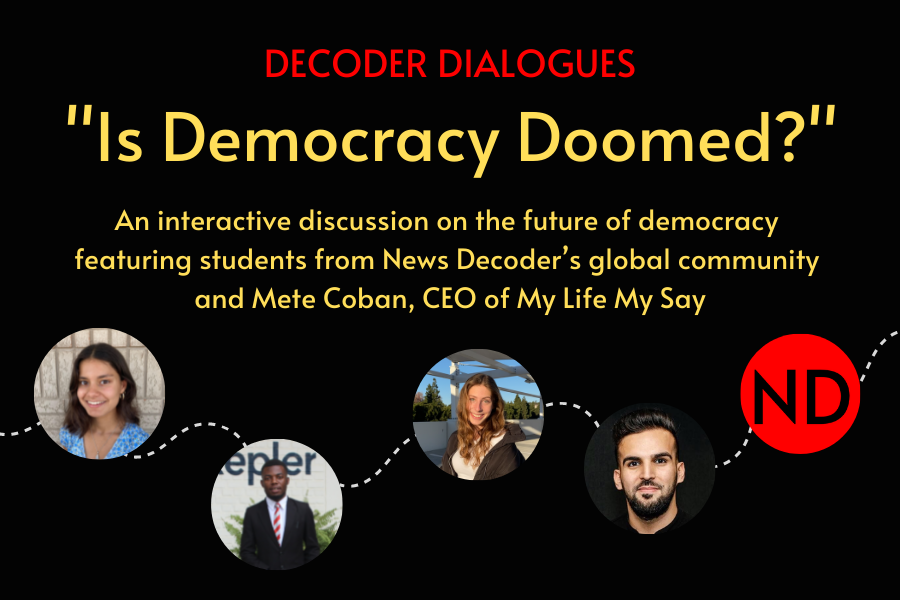
by Karolina Krakowiak | 6 Jul 2023 | Ecologues, European School Brussels, Politics, Writing's on the Wall, Youth Voices
Young climate activists met with experts at the American Library in Paris to discuss how to protect rivers, trees, wildlife and people through legislation. The sixth Ecologues discussion featured Tim Crosland and moderator Alice McCrum, with Linda Sheehan and Irmak...

by Marcy Burstiner | 13 Dec 2022 | Contests, Environment, European School Brussels, News Decoder Updates, Writing's on the Wall
News Decoder has launched a series of projects, funded by the European Union, to help teachers integrate climate change into the classroom. Students at the Climate Academy designed and created a mural in the grounds of their school evoking the rights of young people...

by Aralynn Abare McMane | 8 Dec 2022 | Contests, Educators' Catalog, Environment, European School Brussels
Winners of a worldwide competition will get cash prizes as well as coaching from News Decoder and publication on the News Decoder site. Announcing the Climate Champion Profiles storytelling competition Teenage journalists worldwide are invited to profile someone who...
News Decoder is a member of a consortium of organizations implementing a multifaceted project to engage youth with climate change issues and actions. In this article, News Decoder Adviser Aralynn Abare McMane invites high school students across the world to identify and interview someone in their community working to solve the climate crisis in a significant way, then write an article or produce a video or podcast about that person for submission to a worldwide contest.
Exercise: Find an individual in your community who is trying to fight climate change in a real way. Have students research that person by looking up relevant websites and reading any news articles that have been done or watching any videos that feature that person. Then invite the person to talk to your class and have students prepare questions they would need answered in order to write a profile of that person. Have each student write a profile and submit the best one to the The Writing’s on the Wall Climate Champions Storytelling Competition.

by Isabel Fontan Ireland and Oliver Sanchez de Leon Tuomi | 9 Mar 2022 | Educators' Catalog, Environment, European School Brussels, Podcasts, Student Posts, Youth Voices
Some consider them a nuisance, but bees are critically important. Our podcast, “Plan Bee,” explains how climate change and humans put bees at risk. News Decoder · There's no Plan Bee if our friends the bees perish Bees are a vital part of our...
Climate change is affecting our planet in so many ways that the disruptions can feel overwhelming. Two students at the European School Brussels II train their sights on bees, which play a critical role in protecting our environment. In their 10-minute podcast, Isabel Fontan Ireland and Oliver Sanchez de Leon Tuomi explain why we all should fret over the fate of bees. Their conversation is an excellent example for students interested in audio as a platform for expression.
Exercise: Divide your students into teams of two and have them record a five-minute conversation about a complicated topic that they have researched. The challenge is to make it simple, understandable and engaging.

by Lotte Diry | 18 Jan 2022 | European School Brussels, Personal Reflections, Student Posts, Youth Voices
The person in the mirror is not familiar to me at all. I’m tired and empty, and she is pretty and happy. Where can I find the real ‘me’? I wish I looked like me Gasping for air I open my eyes. Distorted images of boneless hands on my skin slowly fade...

by Tereza Epps, Maya Blenkinsop and Esther Le Bot Gautier | 26 Nov 2021 | Environment, European School Brussels, Student Posts, Technology, Youth Voices
Humans were once on track to destroy Earth’s ozone shield. Collective action averted disaster. Global warming demands the same global cooperation. We’re all frustrated at the inability of governments to take necessary measures to tackle climate change. Drastic...

by Nelson Graves | 17 Nov 2021 | European School Brussels, Government, La Jolla Country Day School, News Decoder Updates, Transylvania College, Youth Voices
In a public webinar, a leading UK youth advocate and students from News Decoder’s network discussed challenges to democracy around the world. Democracy might be in trouble around the world, but it will survive the challenges it is facing in the early 21st...

by Nelson Graves | 12 Nov 2021 | African Leadership Academy, Environment, European School Brussels, Podcasts, Politics, Thacher School, World, Youth Voices
Four students express frustration, anger and disappointment over climate change and urge world leaders to listen to youth before it’s too late. News Decoder · Youth speak out about climate change Frustrated. Angry. Disappointed. Climate change inspires a mix of...

by Nelson Graves | 10 Jun 2021 | African Leadership Academy, Environment, European School Brussels, Health and Wellness, News Decoder Updates, Youth Voices
A reporting project profiling youth who are fighting climate change includes two students at a News Decoder partner school in Belgium. Video of “The Writing’s on the Wall” mural being painted at the European School of Brussels II. Video by Amélie...

by Gustav Paulander, Henrik Skaringer and Thomas Winship | 7 May 2021 | Educators' Catalog, Environment, European School Brussels, Student Posts, Youth Voices
Individual acts to shrink our carbon footprint are fine. But to prevent a climate disaster on Earth, governments must pass laws to cut carbon emissions. News Decoder · The Great Acceleration The numbers are shocking. In just seven decades, our population has more than...
In this podcast, three students from the European School of Brussels II argue that individual acts to shrink our carbon footprint are fine, but governments must pass laws to cut carbon emissions to prevent a climate catastrophe. Gustav Paulander, Henrik Skaringer and Thomas Winship examine “The Great Acceleration” – the dramatic surge in growth across a large range of measures of human activity since the mid-20th Century – and what it implies for our planet’s future.










